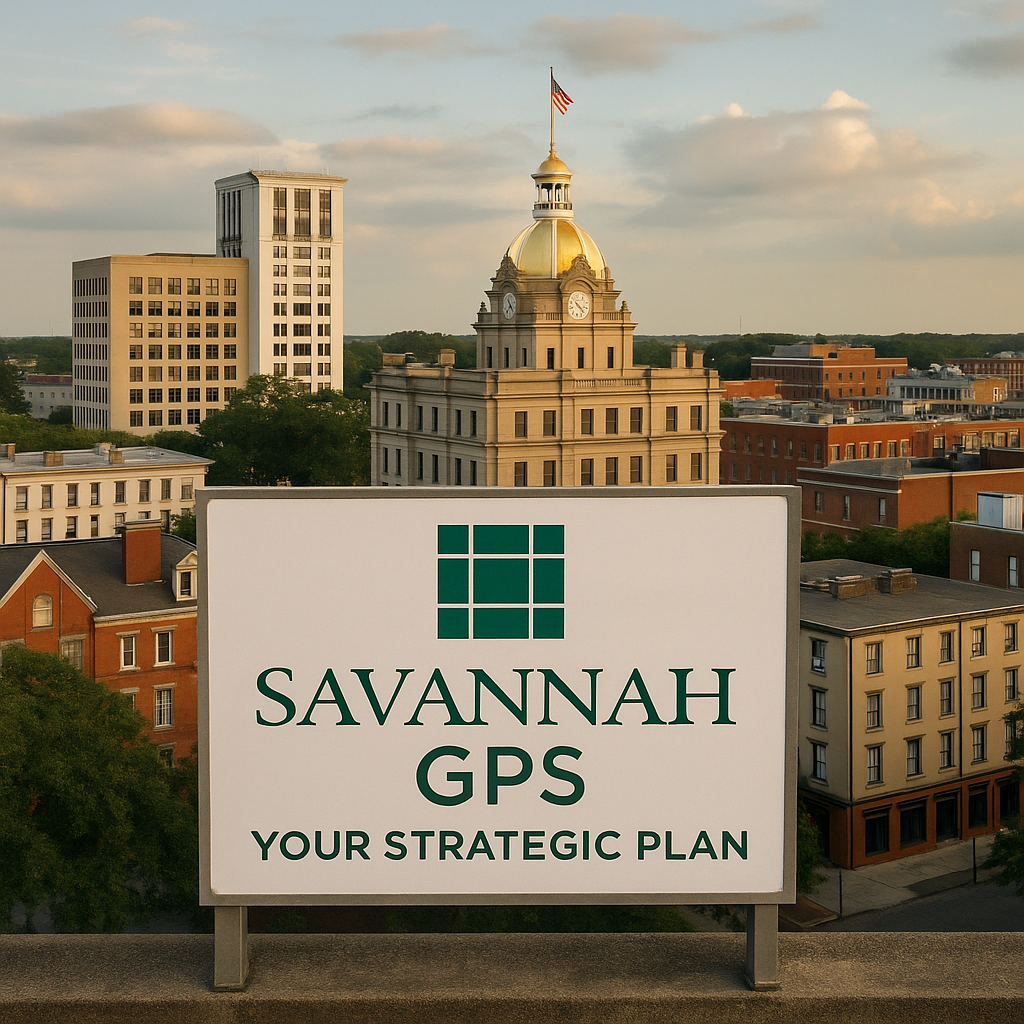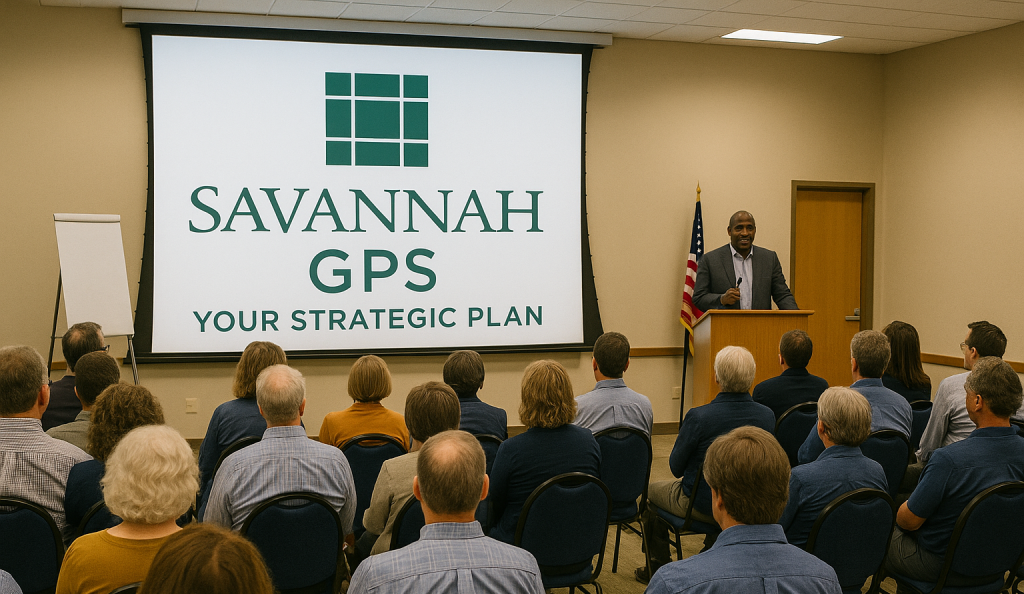Savannah’s Strategic Plan and Fiscal Shifts

By My Neighbors
Savannah, GA – Under the glow of an evening forum next week, Savannah’s leaders will unveil a roadmap they hope will guide the city’s future for years to come. On Wednesday, June 25, the City of Savannah is hosting a “Savannah at Night” town hall at the Otis S. Johnson Cultural Arts Center, where officials will present Savannah GPS: Your Strategic Plan, a comprehensive vision for addressing public safety, housing, infrastructure, equity, and economic growth. The event offers residents a chance to hear details of the draft plan – the city’s first strategic blueprint since 2017 – before the City Council’s expected final adoption the following day. It’s a pivotal moment for a community experiencing rapid growth and facing crucial decisions about how to allocate resources and maintain its character.
City officials describe the strategic plan as a collaborative product of months of engagement. Branded “Savannah GPS” to signify a guiding direction, the plan was developed through extensive outreach that included an online survey and a series of public meetings across all aldermanic districts. More than 1,200 residents provided input on what they envision for Savannah’s future, according to city records. “Your voice matters,” City Manager Joseph Melder emphasized earlier this year, likening the plan to a navigation system steered by citizens’ priorities. “Like the GPS that guides you to your destination, this new strategic plan will help Team Savannah guide our city to the future. I am excited to hear from all the residents and with your help, we will make Savannah an even better place to live, work, play, and prosper,” Melder said. That sentiment is echoed by Mayor Van Johnson, who has championed the initiative. “We want to put the resident’s voice in the driver’s seat… We want to create a strategic plan that guides this city for years to come,” Johnson said, underscoring that the effort is “more than just checking a box – we want genuine engagement.”
At the heart of the plan are six broad goals that reflect Savannah’s aspirations and the crossroads at which the city finds itself. The first goal centers on public safety, aiming to “increase our collective sense of security.” The draft calls for a multi-pronged approach to curb violence and save lives – from stepping up illegal gun confiscation and partnering with community anti-violence programs, to expanding youth mentorship and fully enacting a Vision Zero framework to eliminate traffic fatalities. Fire safety and emergency preparedness are also in focus. For residents, the intended benefit is clear: safer streets and neighborhoods. The challenge, however, lies in turning ambitious promises into palpable change. Savannah, like many cities, has seen concerns over violent crime in recent years, and some community members are likely to watch closely to see if initiatives such as heightened community policing or improved emergency communication truly make a difference on the ground. Balancing tough enforcement with transparency and trust-building is a recurring public concern, one the plan attempts to address by pledging regular reviews of policies on use-of-force and mental health response.
Another pillar of the strategy zeroes in on housing, equity, and community development. The plan’s second goal, to “invest in equitable community development and resiliency,” speaks to a pressing issue: how to ensure that Savannah’s growth does not leave behind its most vulnerable residents. The draft outlines steps to boost the supply of affordable workforce housing by updating ordinances and partnering with developers, and it explicitly ties into the ongoing Housing Savannah Action Plan. It also proposes working with local nonprofits to make homelessness “rare, brief, and nonrecurring,” through a strengthened network of services and housing solutions. Community activists have long urged bolder action on housing affordability, noting that rising rents and property values in Savannah are displacing some long-time residents. City officials hope this strategic plan will formalize a commitment to protect housing stability – for example, by removing regulatory barriers to affordable home construction and by coordinating regional efforts to reduce homelessness. Still, questions arise about funding these aspirations. The plan sets a goal of elevating annual housing investments (a recent task force recommended reaching $100 million per year in combined public-private housing funds) and of incentivizing development in historically underinvested neighborhoods. As residents digest the proposals, some may ask whether City Hall will marshal the budgetary resources and political will to follow through on promises of more equitable development.
Economic growth is a prominent theme as well, framed in the plan’s third goal: “Expand Economic Access, Opportunity, and Vitality for All.” With the Coastal Empire experiencing a business boom – from the port’s expansion to new manufacturing projects – Savannah’s leaders see an opportunity to broaden prosperity. The strategic plan calls for investment in workforce training programs to connect local people with high-paying jobs in emerging industries. It also emphasizes support for small businesses and entrepreneurs, including targeted incubators and incentives for minority-owned enterprises. In a city proud of its historic charm and tourism, there is an added focus on diversifying the economy and revitalizing neighborhood commercial corridors beyond the well-trodden historic district. Business groups have largely welcomed these ideas, especially efforts to streamline permitting and city procurement to favor local firms. The plan also nods to mitigating gentrification: it proposes incentives to spur investment in long-neglected areas while preventing displacement of existing residents – a delicate balance that community advocates will monitor closely. Achieving inclusive economic growth, many agree, will hinge on execution. The vision of “vitality for all” is bold, but residents and businesses alike will be looking for measurable outcomes such as job placement rates, new storefronts in underserved neighborhoods, and reduced economic disparities across the city.
Investing in Savannah’s physical foundation is another cornerstone of the strategic roadmap. Goal four, to “develop world-class livable environments and infrastructure,” comes as the city grapples with aging systems, traffic pressures, and the impacts of climate change. The draft plan outlines an overhaul of infrastructure planning, starting with a comprehensive stormwater management plan to combat chronic flooding in low-lying areas. It prioritizes upgrading roads, bridges, and sidewalks – not just downtown but in all districts – to improve connectivity and safety. Savannah’s infrastructure ambitions extend to embracing technology (using sensors to monitor utilities in real time) and modernizing public facilities for a growing population. In addition, the plan explicitly weaves in environmental stewardship: continuing the city’s 100% Clean Energy initiatives, expanding green spaces and tree planting, and updating building standards to encourage sustainable design. For a coastal community regularly tested by hurricanes and extreme heat, these resiliency measures are seen as essential long-term investments. The potential hurdle, again, is funding and phasing such large projects. Residents generally applaud attention to flooding and transit issues – frequent complaints in town hall meetings – but they will expect the city to secure grants or dedicate capital funds to turn plans into construction. With Savannah at a developmental crossroads, the strategic plan’s success may be judged by whether infrastructure keeps pace with growth without sacrificing the city’s environmental health and charm.
Beyond the big-ticket initiatives, the plan drills down on everyday quality of life and the nuts-and-bolts of city services. Goal five commits to “improve quality of life by raising municipal service standards.” That means cleaner streets, well-maintained parks, and reliable basic services that residents notice daily. The city promises stepped-up enforcement against blight and graffiti, more frequent upkeep of public spaces, and an upgrade of the 311 citizen request system for faster response times. In many Savannah neighborhoods, small issues like litter, speeding, or delayed trash pick-up can erode confidence in local government. By vowing to “enhance residential services” and even measure customer satisfaction, officials aim to show that the strategic plan is not just about grand projects but also about getting the little things right. Some neighborhood associations have already voiced cautious optimism about these commitments – noting that previous improvement campaigns have come and gone. The difference this time, City Hall insists, is a data-driven approach and accountability: new tools to track service requests and periodic reviews of performance standards. If the plan is adopted, residents will be watching to see if their garbage collection truly gets more consistent or if code violations in their community are addressed more swiftly than before.
Finally, underpinning all of these goals is an inward look at City government itself and how it manages taxpayer dollars. The sixth goal, aptly titled “Always Be a High-Performing Government,” calls for raising the bar on efficiency and transparency. The strategic plan emerges at a time when fiscal shifts are on the minds of city officials – Savannah’s budget is under pressure to fund new initiatives while maintaining prudent reserves and a strong credit rating. The plan explicitly pledges to keep tax rates “as low as possible” by finding savings through operational efficiencies and cutting waste. It also stresses linking every budget dollar to the priorities laid out in the plan, effectively using the strategic goals as a compass for annual spending decisions. For taxpayers, this approach is meant to ensure that ambitious programs in public safety, housing, and infrastructure don’t translate into unchecked tax hikes or fiscal strain. Still, some fiscal hawks might question how the city can simultaneously hold down taxes and invest heavily in new programs – a potential point of debate as Savannah enters its budget planning cycle for next year. In the realm of governance, the plan emphasizes modernizing how City Hall works: upgrading technology for public services (from billing systems to permitting portals) and investing in the city workforce through training and competitive pay. The intended outcome is a more responsive City government that can deliver the plan’s promises effectively. Skeptics may point out that bureaucratic changes can be slow and complex, but the inclusion of this goal signals that officials see the plan’s success tied closely to reforming themselves. A strategic vision, they acknowledge, is only as good as the city’s capacity to implement it.
As the “Savannah at Night” forum approaches, anticipation and cautious hope are growing in the community. The strategic plan’s title – “Your City. Your Future. Your Voice.” – encapsulates the inclusive ethos leaders want to project. The plan paints a picture of Savannah as a safer, greener, and more prosperous city that retains its unique heritage while ensuring opportunity for all residents. Longtime Savannahians, newcomers, business owners, and neighborhood advocates will gather on June 25 to hear how that picture is coming into focus. For supporters, this moment is a chance to rally around a shared vision and hold leaders accountable to pursue it. For the skeptical, it is an opportunity to press for more details and guarantees that the lofty goals will yield tangible improvements in everyday life. Savannah is at a crossroads: booming development and rising revenues give it momentum, but questions of equity, resilience, and quality of life demand thoughtful navigation. This strategic plan aims to be the roadmap through those crossroads. After Wednesday’s town hall and the City Council’s vote on June 26, Savannahians will begin to learn whether that roadmap leads toward the community they’ve envisioned – and how the city’s fiscal and developmental choices will shape the next chapter of Savannah’s story.
SOURCES
City of Savannah (Marketing & Communications) – “City Leaders Host Savannah At Night to Provide Public Update on Draft Strategic Plan” (News Release, June 18, 2025) – City announcement of the June 25 town hall and overview of the Savannah GPS strategic plan update.
City of Savannah (Office of the City Manager) – Savannah GPS: Developing Our Strategic Plan Together (Draft Strategic Plan and public engagement details, 2025) – Official strategic plan document and summary of community input process.
Savannah City Council Agenda – Public Hearing on the Draft Savannah GPS Strategic Plan (June 12, 2025) – Agenda item description outlining the six strategic priorities and noting resident engagement in plan development.
WJCL News – “Savannah GPS Strategic Plan: How people can share improvements they’d like to see in the city” (Feb. 3, 2025) – Local news report on the launch of the strategic planning initiative, including quotes from Mayor Van Johnson about public engagement.
WTOC News – “City of Savannah invites community to review draft of new strategic plan” (June 2, 2025) – News brief on the release of the draft Savannah GPS plan and the timeline for public comments and council adoption.
City of Savannah (Marketing & Communications) – “City Wants Residents to Shape the Future of Savannah” (Press Release, Jan. 23, 2025) – Initial announcement of the Savannah GPS initiative with quotes from City Manager Joseph A. Melder and an outline of the plan’s mission and goals.
Frequently Asked Questions (FAQs)
What is “Savannah GPS: Your Strategic Plan”?
“Savannah GPS” is the City of Savannah’s official strategic plan, designed to guide city priorities and investments over the coming years. It outlines six core goals focused on public safety, housing equity, economic development, infrastructure improvements, service quality, and government transparency.
How was the community involved in developing the strategic plan?
The city conducted a multi-month outreach campaign that included public forums in all aldermanic districts, an online survey, and focus sessions. Over 1,200 residents contributed feedback, shaping the content and direction of the final draft plan.
What are the biggest concerns residents have raised about the plan?
Key concerns include whether the city can realistically fund its ambitious goals without raising taxes, how it will ensure housing affordability amid rapid development, and whether proposed public safety and infrastructure improvements will lead to tangible, measurable results.
When will the plan be finalized and adopted?
The draft plan will be formally presented to the public at the “Savannah at Night” event on June 25. City Council is scheduled to review and vote on the plan the following day, June 26.
How will the city measure progress once the plan is adopted?
The strategic plan includes commitments to data-driven performance tracking, regular reporting, and aligning city budgets with the plan’s objectives. Residents will be able to monitor progress through public dashboards and city performance updates.


My Neighbors













Get involved!
Comments